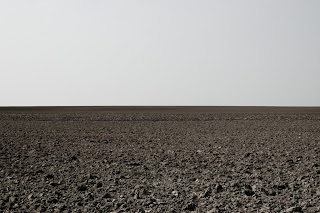
(Photo: Wasteland by Denis Defreyne)
Becoming a professor no longer guarantees academic freedom
I had been a non-tenure professor of Kyoto University from April 2010 to January 2013. The life was unfortunately not so happy one, and I’ve already written a part of my story as a blog article. In this essay I’ll write about another part of the story.
My father Tsuneji Rikitake was a prestigious professor. He devoted his life for the geophysics and seismic research. He also went abroad to study Earthquakes, in Turkey, Canada, and at University of Colorado Boulder. He officially retired in 1991 when he became 70 years old. I owe him a lot on getting myself familiarized with mathematics, physics, and computers, from an early stage of my life. I often thought I would like to become a “professor” if I could in my childhood.
My expectation on the academic lifestyle, however, was shattered during my life at University of Tokyo from 1984 to 1990. I was quite disappointed with the huge bureaucracy prevailing in the organization; one of the example of the inefficiency was the university had two trans-Pacific TCP/IP links already in 1988, though the one was only for some dedicated science research projects which ordinary students including me at that time was not permitted to use at all. And you had to show up to the lab even if you could telecommute with the terminals and modems. I was so disillusioned and decided to leave the university after barely getting a degree of Master of Engineering.
I’ve seen a lot of unhappy people in the academics too. Many of them suffered (and still suffer) a long period of years even after getting the PhD as Joshu (or now Jokyo), the words which stand for the educational staff who have no budget privilege by themselves and have to obey the commandments of Koushi (or the lecturers), Jokyoju (or now Junkyoju), and Kyoju. It’s more like the military; Koushi and Junkyoju professors are with some budget privileges, but still under the control of their bosses aka the Kyoju (full professor).
Even in 1989 I thought those Joshu/Jokyo people were not really well respected because many of them often had to work overtime to help the private part of lives of the Koushi, Junkyoju or Kyoju, of higher-ranked members. I know at least a couple of people who got sick and tired of this near-slavery treatment against Josyu and got permanently left from the academic society and got successful life in the business world. So I didn’t want to take a job as a postdoc with Josyu (now Jokyo) position. I thought I would rather want to be a software engineer working for a corporation, under a proper governance abiding the labor laws and the corporate policies and procedures.
When I decided to take a job offer as a non-tenured time-limited (max 4.5 years) professor or Kyoju of Kyoto University, my primary assignment was far different from the one which my father would have taken; I was expected to work at least 70% of the “working effort rate” (I still don’t understand what this actually means) as an administrative work of the university. I was not allowed to take my own student or perform educational activities except for doing my own research. And the job offer statement even included that the candidate accepted the job would be reassigned as a full-time administrative staff. This was a terrible condition comparing to the other Kyoju people who were only doing the research activities. I didn’t have much choice though, because my employment contract was due March 31, 2010, and there was no other offer available at that time.
I was lured by the illusion of becoming a full professor, even without tenure. I could be something like my dad. At least people would call me so.
I made a terrible mistake.
Eventually I realized the hard cold fact of working as a pseudo-research professor. My position was in continuous professional and bureaucratic limbo; I was neither a full administrative staff nor an educational staff. I was physically alone even during the lunch hours; I intentionally or unintentionally had the lunches alone. Very few people talked to me for something other than work-related issues. I had some financial freedom of my own research budget (within the 30% working effort rate hours), and people were polite, but I realized I was working in somewhere which I least wanted to be.
What I saw in the year 2010 was a wasteland with the corpses of poor soldiers virtually (or some even actually) deceased due to the worst workplace condition or systematic bullying towards newcomers. And that was the scene exactly I had seen during my early years of life in 1989.
I see quite a few articles on Medium and elsewhere about staying out of the graduate school by all means and not taking the academic postdoc jobs even if you could endure all the burdens of becoming a PhD. Reading the phdcomics.com itself will let you understand how the life of the graduate school is surreal and unbearable without a lot of humor (though I’ve never been a professor like this person.) And I have to warn you that things are always getting worse and worse every year. The workplace condition in the universities (at least in Japan but maybe also in many other places of the world) are no longer bareable if you want to be treated as a real person.
At the University of Tokyo, my father became a Josyu in 1942, Jokyoju in 1949, and Kyoju or a full professor in 1962. Maybe the 50 years of time changed the whole academic landscape, from a fertile source of the joy of research and education, to the wasteland of cheap labor provided by second-class newcomers for feeding the old landlords.
Exported from Medium on July 17, 2013 / updated on July 25, 2013.